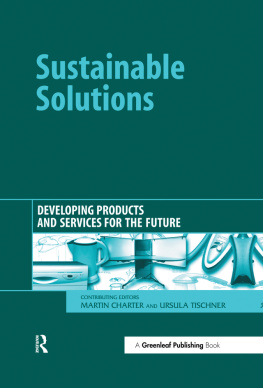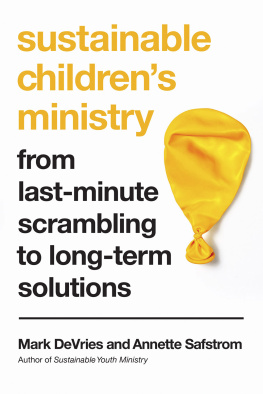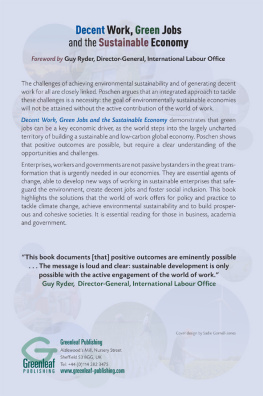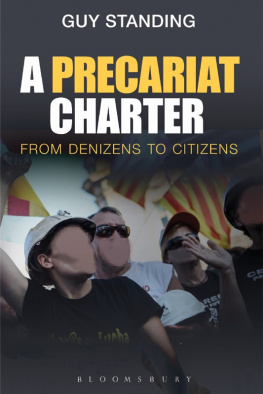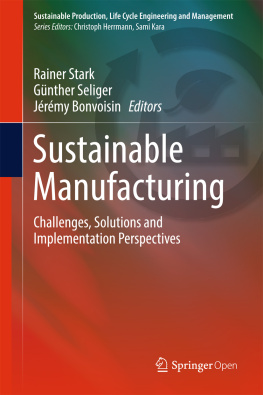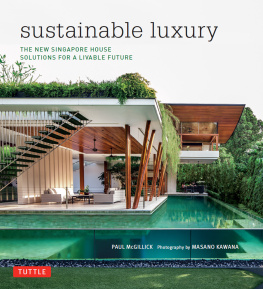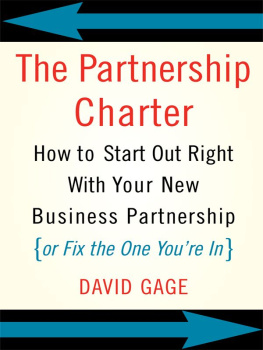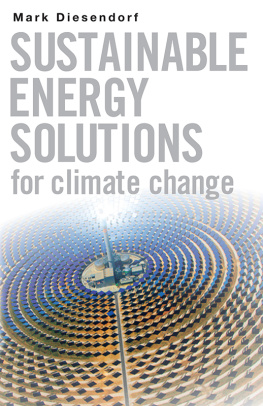Charter Martin - Sustainable Solutions
Here you can read online Charter Martin - Sustainable Solutions full text of the book (entire story) in english for free. Download pdf and epub, get meaning, cover and reviews about this ebook. publisher: Taylor & Francis Group, genre: Romance novel. Description of the work, (preface) as well as reviews are available. Best literature library LitArk.com created for fans of good reading and offers a wide selection of genres:
Romance novel
Science fiction
Adventure
Detective
Science
History
Home and family
Prose
Art
Politics
Computer
Non-fiction
Religion
Business
Children
Humor
Choose a favorite category and find really read worthwhile books. Enjoy immersion in the world of imagination, feel the emotions of the characters or learn something new for yourself, make an fascinating discovery.
- Book:Sustainable Solutions
- Author:
- Publisher:Taylor & Francis Group
- Genre:
- Rating:3 / 5
- Favourites:Add to favourites
- Your mark:
- 60
- 1
- 2
- 3
- 4
- 5
Sustainable Solutions: summary, description and annotation
We offer to read an annotation, description, summary or preface (depends on what the author of the book "Sustainable Solutions" wrote himself). If you haven't found the necessary information about the book — write in the comments, we will try to find it.
Sustainable Solutions — read online for free the complete book (whole text) full work
Below is the text of the book, divided by pages. System saving the place of the last page read, allows you to conveniently read the book "Sustainable Solutions" online for free, without having to search again every time where you left off. Put a bookmark, and you can go to the page where you finished reading at any time.
Font size:
Interval:
Bookmark:

SUSTAINABLE SOLUTIONS
DEVELOPING PRODUCTS AND SERVICES FOR THE FUTURE
Contributing Editors: Martin Charter and Ursula Tischner
Developing Products and Services for the Future
Contributing Editors
Martin Charter and Ursula Tischner

First published 2001 by Greenleaf Publishing Limited
Published 2017 by Routledge
2 Park Square, Milton Park, Abingdon, Oxon OX14 4RN
711 Third Avenue, New York, NY 10017, USA
Routledge is an imprint of the Taylor & Francis Group, an informa business
Copyright 2001 Taylor & Francis
All rights reserved. No part of this book may be reprinted or reproduced or utilised in any form or by any electronic, mechanical, or other means, now known or hereafter invented, including photocopying and recording, or in any information storage or retrieval system, without permission in writing from the publishers.
Notice:
Product or corporate names may be trademarks or registered trademarks, and are used only for identification and explanation without intent to infringe.
British Library Cataloguing in Publication Data:
A Catalogue record of this book is available from the British Library.
ISBN 978-1-874719-36-6 (hbk)
Most of the discussion about business sustainability to date has focused on the corporate management level, with a lack of emphasis on product and service development issues. We perceived this gap in knowledge and information and decided to invite the leading global experts from business and academia to explore the business, design and organisational issues surrounding ecodesign, eco-product development and sustainable product design (SPD). Sustainable Solutions is aimed at environmental directors, product developers and designers in companies and consultancies, as well as academics and students, policy-makers and NGOs. It constitutes a global state of the art and practice of SPD.
The book is business-oriented with a prime focus on the product and service development process. As product development (supply) is always dependent on demand, sustainable consumption issues are also discussed. Most of the books authors are drawn from industrialised countries. However, as sustainable development is obviously impossible without the involvement of less developed countries, chapters and case studies have been included that explore the Southern perspective.
Most of the chapters in Sustainable Solutions cover ecodesign and eco-product development. SPD, which we argue expands ecodesign to incorporate wider social and ethical considerations in the process, is also referred to, and sometimes these terms are used interchangeablywhich reflects the newness of the topic. The book puts an emphasis on product development and design because this phase accounts for more than 80% of the economic costs and environmental impacts (and possibly social impacts) of a product during its whole life-cycle (excavation of raw materials, production, use, recycling and disposal).
Martin Charter Ursula Tischner
Farnham, UK Cologne, Germany
August 2000
The editors would like to thank all the authors for their thinking and hard work and the employees of The Centre for Sustainable Design, econcept and Greenleaf Publishing for co-operation and motivation. Thanks also go to our families for their encouragement and support.
Jacqueline Aloisi de Larderel
Director, Division of Technology, Industry and Economics, United Nations Environment Programme
Regardless of recent efficiency improvements in the development of products and services, a growing population and the emergence of a dynamic global consumer culture are fuelling environmental deterioration. UNEPs Global Environment Outlook 2000 highlights the urgent necessity for adopting sustainable practices at all levels of society, and over 100 environment ministers, gathered by UNEP in June 2000 in Malm, Sweden, for the first global environmental forum, called for the development of cleaner and more resource-efficient technologies for a life-cycle economy.
Changes in consumption and production patterns will depend on the actions of all stakeholders. Today, the business sector is increasingly expected to respond to the demands of society for improved environmental, social and ethical performance. The global sustainability debate has evolved to the point where businesses must consider the impacts of products and services throughout life-cycle and supply chains. This calling for change is the fundamental rationale behind business and governmental support for moving corporate responsibility issues to the forefront of the global agenda.
At the 1999 World Economic Forum in Davos, UN Secretary General Kofi Annan proposed a Global Compact to ensure that there is a human face to the global market. He urged companies to commit themselves to apply recognised principles and standards in three areas: human rights, labour standards and environmental protection.
The business sector is beginning to realise that financial and social benefits will arise from incorporating practices of sustainability. Energy efficiency, recycling and maximising the use of raw materials can all deliver profitable returns, as can clean, efficient production processes and innovative sustainable products. The power of consumptionas a driving force towards sustainable developmentis in many ways greater than the power of legislative and regulatory measures, hence the escalating attention among decision-makers worldwide for the concept of sustainable consumption.
Since the Rio Earth Summit in 1992, UNEP has been catalysing the implementation of Cleaner Production and Sustainable Consumption throughout the world. This remarkable book demonstrates that solutions are available and that innovative thinking, drawing from current technological changes, can lead to considerable improvements towards sustainability.
Sustainable Solutions successfully demonstrates the enormous business opportunities relating to ecodesign and sustainable product design (SPD). UNEP congratulates the authors of this publication which emphasises a variety of innovative examples that are drawn from both large and small companies and from both developed and developing countries. Decisively, Sustainable Solutions approaches the elements of consumption and production in an integrated manner. With the adoption of a life-cycle economy remaining as a considerable global challenge, this book will carry us somewhat closer to a sustainable future.
Martin Charter
The Centre for Sustainable Design, UK
Ursula Tischner
econcept, Germany
SUSTAINABLE SOLUTIONS ARE PRODUCTS, SERVICES, HYBRIDS OR SYSTEM changes that minimise negative and maximise positive sustainability impactseconomic, environmental, social and ethicalthroughout and beyond the life-cycle of existing products or solutions, while fulfilling acceptable societal demands/needs. Sustainable solutions require multi-stakeholder engagement and involve changes or shifts in consumption and production patterns. The aim of sustainable solutions is to create a positive net sustainable value (positive impacts should outweigh negative impacts) for all stakeholders in the delivery process. Changes may be incremental at the product level or radical if system shifts are needed.
Ecodesign has evolved primarily from the engineering and life-cycle assessment (LCA) communities and has therefore often been technically rather than business or organisationally focused. The first phase of greener product development has tended to produce one-off eco-(re)designs within research and development (R&D) departments, with relatively few companies implementing environmental considerations throughout the product development process. As a result, ecodesign management systems have remained immature. The reasons for this are manifold, but include a lack of corporate vision, perceived high costs, weak market awareness and the risks associated with being too far ahead of the market.
Font size:
Interval:
Bookmark:
Similar books «Sustainable Solutions»
Look at similar books to Sustainable Solutions. We have selected literature similar in name and meaning in the hope of providing readers with more options to find new, interesting, not yet read works.
Discussion, reviews of the book Sustainable Solutions and just readers' own opinions. Leave your comments, write what you think about the work, its meaning or the main characters. Specify what exactly you liked and what you didn't like, and why you think so.

